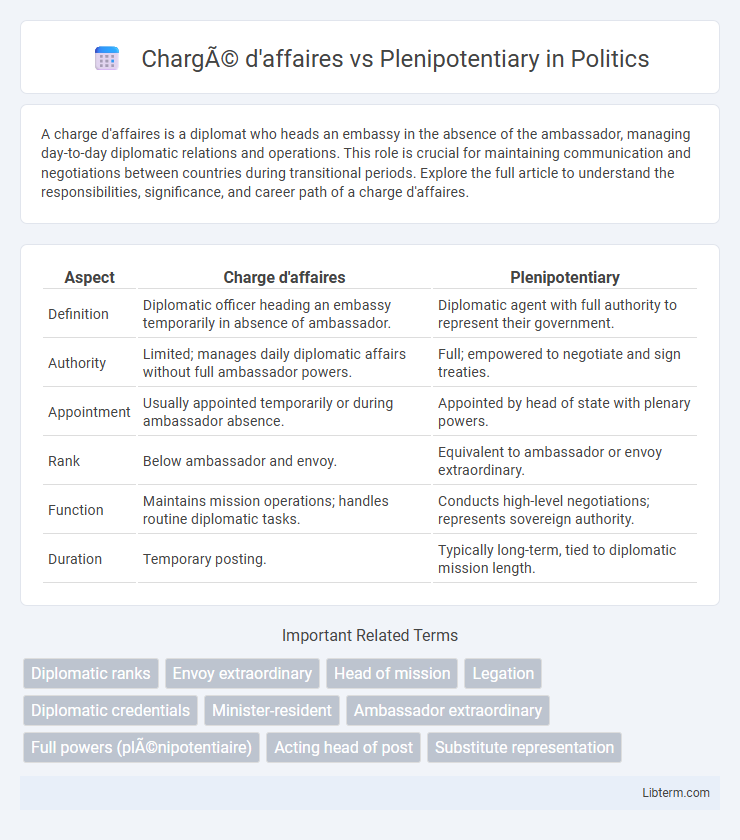A charge d'affaires is a diplomat who heads an embassy in the absence of the ambassador, managing day-to-day diplomatic relations and operations. This role is crucial for maintaining communication and negotiations between countries during transitional periods. Explore the full article to understand the responsibilities, significance, and career path of a charge d'affaires.
Table of Comparison
| Aspect | Charge d'affaires | Plenipotentiary |
|---|---|---|
| Definition | Diplomatic officer heading an embassy temporarily in absence of ambassador. | Diplomatic agent with full authority to represent their government. |
| Authority | Limited; manages daily diplomatic affairs without full ambassador powers. | Full; empowered to negotiate and sign treaties. |
| Appointment | Usually appointed temporarily or during ambassador absence. | Appointed by head of state with plenary powers. |
| Rank | Below ambassador and envoy. | Equivalent to ambassador or envoy extraordinary. |
| Function | Maintains mission operations; handles routine diplomatic tasks. | Conducts high-level negotiations; represents sovereign authority. |
| Duration | Temporary posting. | Typically long-term, tied to diplomatic mission length. |
Introduction to Diplomatic Ranks
Charge d'affaires is a diplomatic rank assigned to an envoy who temporarily heads an embassy in the absence of an ambassador, often maintaining ongoing diplomatic relations at a lower level. Plenipotentiary is a higher diplomatic rank granted to an official fully authorized to represent their government and negotiate treaties on its behalf, possessing complete decision-making powers. Understanding these ranks is essential in diplomatic protocol, as they define the scope of authority and formal recognition in international relations.
Defining Chargé d'affaires
A Charge d'affaires is a diplomat who heads an embassy in the absence of the ambassador, serving as the acting chief of mission with limited authority. Unlike a plenipotentiary, who has full powers to negotiate and sign treaties on behalf of their government, a Charge d'affaires operates with delegated responsibilities, typically during transitional periods or diplomatic downgrades. The role emphasizes maintaining diplomatic relations and managing embassy affairs without the extensive mandate granted to plenipotentiaries.
Understanding Plenipotentiary Roles
A Plenipotentiary holds full authority to represent their government in diplomatic matters, enabling them to negotiate and sign treaties without needing prior approval. Charge d'affaires, however, typically act as interim or lower-ranking diplomats, managing embassy affairs in the absence of an ambassador. Understanding the plenipotentiary role highlights the diplomatic power vested in these envoys to make binding decisions on behalf of their state.
Historical Origins and Evolution
The title Charge d'affaires originated in the 18th century as a diplomatic agent temporarily heading a mission during the absence of an ambassador, evolving from practical necessity in European diplomacy. Plenipotentiary dates back to the 16th century, granting full powers to diplomats for negotiating and signing treaties, reflecting sovereign authority delegation. Over time, Charge d'affaires became a permanent rank for lower-level diplomats while plenipotentiaries maintained high-level negotiation powers in international relations.
Appointment and Accreditation Procedures
Appointment of a Charge d'affaires involves designation by the foreign minister or head of mission rather than by the head of state, and they present credentials directly to the foreign minister of the host country. In contrast, a Plenipotentiary is appointed by the head of state, often through a formal letter of credence, and undergoes an accreditation process that involves presenting these credentials to the host country's head of state. The distinction in accreditation procedures reflects differences in diplomatic rank and authority, with Plenipotentiaries holding full powers to represent their government, while Charges d'affaires typically serve in a temporary or lower-ranking capacity.
Key Responsibilities and Powers
A Charge d'affaires primarily manages diplomatic missions temporarily in the absence of an ambassador, handling routine diplomatic duties and maintaining bilateral relations without full ambassadorial authority. In contrast, a Plenipotentiary possesses full powers to negotiate and sign treaties on behalf of their government, representing the highest level of authority in diplomatic negotiations. The plenipotentiary's role is crucial in formalizing international agreements, while the charge d'affaires ensures continuity in diplomatic representation.
Differences in Diplomatic Representation
Charge d'affaires represents a diplomatic mission temporarily or in the absence of an ambassador, usually with limited authority and lower rank. Plenipotentiary holds full powers granted by their government to negotiate and sign treaties, acting as the highest-ranking diplomat with comprehensive authority. The key difference lies in the scope of authority and the official diplomatic status, with plenipotentiaries empowered to make binding decisions, whereas charges d'affaires serve mainly as interim representatives.
Protocol Status and Precedence
A Charge d'affaires holds a lower protocol status and precedence than a Plenipotentiary as they act as a temporary head of mission without full ambassadorial rank. Plenipotentiaries possess full diplomatic authority and typically receive higher precedence in official ceremonies and negotiations. Their rank reflects their empowerment by the sending state, granting Plenipotentiaries superior protocol status in the international diplomatic hierarchy.
Impact on International Relations
Charge d'affaires and plenipotentiary hold distinct roles in diplomacy, with the plenipotentiary wielding full authority to negotiate and sign treaties, significantly influencing international relations through decisive treaty commitments. A charge d'affaires typically acts as a temporary or lower-ranking diplomat, managing day-to-day embassy functions without the extensive negotiating power of a plenipotentiary. This differentiation affects diplomatic negotiations, with plenipotentiaries enabling stronger bilateral agreements and charges d'affaires maintaining ongoing diplomatic communication and operational continuity.
Modern-Day Relevance and Usage
The modern-day relevance of Charge d'affaires lies in their role as acting heads of diplomatic missions during the absence or vacancy of an ambassador, ensuring continuity of diplomatic relations. Plenipotentiaries, often granted full authority to negotiate and sign treaties on behalf of their governments, remain crucial in specialized diplomatic negotiations and international agreements. Understanding these distinct roles enhances clarity in diplomatic protocols and informs the strategic deployment of diplomatic personnel in contemporary foreign service operations.
Chargé d'affaires Infographic

 libterm.com
libterm.com